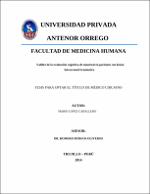Validez de la evaluación cognitiva de montreal en pacientes con lesion intracraneal traumatica

View/Open
Download
(application/pdf: 569.2Kb)
(application/pdf: 569.2Kb)
Date
2014Author(s)
Lopez Caballero, Mario
Metadata
Show full item recordAbstract
Determinar si la evaluación de Montreal tiene validez pronóstica para detectar la presencia de alteración cognitiva en pacientes con lesión intracraneal traumática en el Hospital Regional Docente de Trujillo.
MATERIAL Y MÉTODO: Se realizó un estudio observacional, analítico, de pruebas diagnósticas, que evaluó 132 pacientes distribuidos en dos grupos: Grupo I = 106 pacientes con TEC y Grupo II = 26 pacientes sin TEC en el periodo de estudio comprendido entre Diciembre del 2013 a Enero del 2014.
RESULTADOS: El promedio de la edad de los pacientes con TEC fue 35,51 ± 14,27 años y de los pacientes sin TEC 30,69 ± 12,93 años; la proporción de pacientes del sexo masculino en los pacientes con y sin TEC fueron 66,98% y 65,38% respectivamente. En lo que respecta al score del MoCA, se observó que el promedio de los pacientes con TEC fue 25,52 ± 2,20 y el promedio de los pacientes sin TEC fue 28 ± 1,55; al categorizar el score MoCA y relacionarlos en función a la presencia de TEC se observó que 55,66% de los pacientes con TEC tuvo un score MoCA < 26, compatible con alteración cognitiva y en los que no tuvieron TEC solo el 11,54%. El rendimiento de la Evaluación Cognitiva de Montreal (MoCA), para predecir alteración cognitiva en pacientes con TEC, a un punto de corte < 26, la sensibilidad, especificidad, VPP y VPN fueron 55,66%, 88,46%, 95,16% y 32,86% respectivamente. El área bajo la curva (a través de la curva ROC) fue 0,82.
CONCLUSIONES: La evaluación cognitiva de Montreal tuvo un rendimiento diagnóstico del 82% en predecir alteración cognitiva en pacientes con TEC.
PALABRAS CLAVES: Evaluación cognitiva de Montreal, Traumatismo encefalocraneano. To determine whether the evaluation of Montreal has prognostic validity for the presence of cognitive impairment in patients with traumatic intracranial injury Trujillo Regional Teaching Hospital.
MATERIAL AND METHODS: We performed an observational, analytical, diagnostic test, which evaluated 132 patients divided into two groups: Group I = 106 TBI patients and Group II = 26 patients without TBI in the study period between December 2013 to January 2014.
RESULTS: The mean age of patients was 35,51 ± 14,27 years in the group with TBI and 30,69 ± 12.93 years in patients without TBI; the proportion of male in patients with and without TBI were 66,98% and 65,38% respectively. In regard to the MoCA score was observed that the mean in TBI patients was 25,52 ± 2,20 and the mean was 28 ± 1.55 in patients without TBI; MoCA score to categorize and relate in function in the presence of TBI was seen that 55,66% of TBI patients had a MoCA < 26 score, compatible with cognitive impairment and in the patients without TBI there were only 11,54%. The performance of the Montreal Cognitive Assessment (MoCA), to predict cognitive impairment in TBI patients, a cutoff < 26, the sensitivity, specificity, PPV and NPV were 55,66%, 88,46%, 95,16% and 32,86% respectively. The area under the curve (through the ROC curve) was 0,82.
CONCLUSIONS: The Montreal cognitive assessment had a diagnostic performance of 82% in predicting cognitive impairment in patients with TBI.
KEYWORDS: Montreal Cognitive Assessment, Traumatic brain injury.
Collections
- Medicina Humana [3196]

